
Interviewees: Ethan Shell, Alana Knapke, and Christina Beran
Interviewer: Stormmy Boettcher (SNAC Chair) and Kimberly Gollhofer (SNAC Secretary)
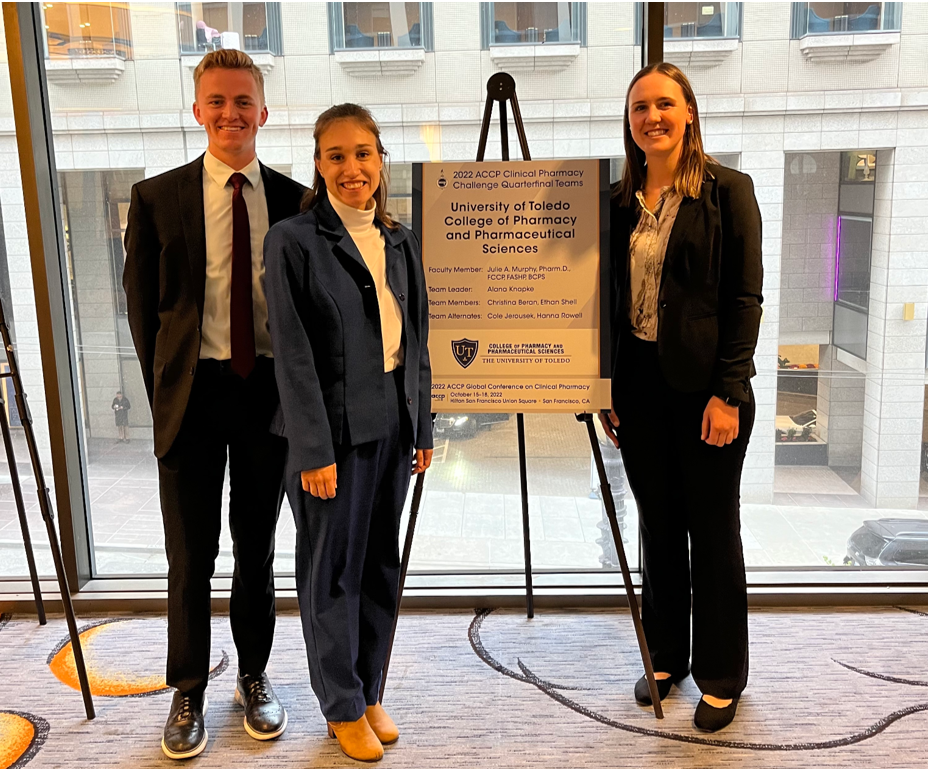 Meet the Winners of the 2022 Clinical Pharmacy Challenge!
Meet the Winners of the 2022 Clinical Pharmacy Challenge!
(Left to Right: Ethan Shell, Christina Beran, and Alana Knapke)
This year, Ethan Shell, Christina Beran, and Alana Knapke from the University of Toledo College of Pharmacy and Pharmaceutical Sciences earned the title of ACCP’s 2022 Clinical Pharmacy Challenge (CPC) champions. Under the guidance of Dr. Julie Murphy, Pharm.D., the team was able to compete in the live competition at the 2022 ACCP Global Conference in San Francisco.
Ethan is a third-year student from Saline, Michigan and would like to become an ambulatory care pharmacist because he wants to help patients live their lives better and be accessible to provide information to all patients. Ethan's favorite movie is Rush Hour, and he enjoys playing sports like tennis, golf, and basketball. Alana is a fourth-year student from St. Henry, Ohio and she would like to complete a PGY1 residency. She has an interest in internal medicine because of the variety of experiences it provides. Alana’s favorite show is Grey’s Anatomy, and she enjoys playing sand volleyball, reading fiction books, and running. Christina is a third-year student from Brunswick, Ohio and is hoping to specialize in infectious diseases or critical care and be an innovative provider for her patients. Christina’s favorite show is House, MD and she enjoys water skiing, dancing, reading adventure and mystery books, and hanging out with friends. After their victory, ACCP National Student Network Advisory Committee Chair (Stormmy Boettcher) and Secretary (Kimberly Gollhofer) sat down with the team to ask a few questions:
Why did you choose pharmacy?
Ethan: I initially wanted to develop drugs to cure cancer. However, I fell in love with the feeling that I get when I help a patient. Now, my passion for pharmacy lies in the unique opportunity it gives me to impact a patient’s life in a positive way.
Alana: My mom is a nurse and I really enjoyed chemistry in high school, so I combined my inspiration for helping others through healthcare from my mom and my love for chemistry and found that pharmacy fit the bill perfectly.
Christina: Pharmacy is an opportunity to use my passion for science and innovation to help others.
|
How did you choose to work together on this team?
We were all selected based on scores from our college’s local exam through ACCP. We competed against about a dozen other Toledo students.
|
What did you do to prepare?
We decided to divide the provided list of possible topics amongst the three of us. Over the summer, we each studied seven topics. Our goal was to ensure that we were confident in our knowledge base for the assigned topics so that we could confidently educate one another and provide answers for those specific topic sections during the challenge rounds. We worked together to exchange ideas and collaborate on each question topic and style. To prepare each topic we used ACPEs didactic tool kit and focused on the higher ranked concepts. We also used the clinical guidelines to provide a full understanding from diagnosis to treatment to long term management.
Our clinical rotations and previous work experiences helped provide clinical pearls and real-life examples when provided with difficult topics and concepts. For our team, Alana was considered to be the outpatient expert, while Ethan and Christina both have inpatient experience.
|
What tips or tricks do you have for future competitors?
Listen to each team member's perspective, be confident in what you know, review the possible topics from various sources?? (is that what they meant?)(textbooks, databases, class notes, etc).
|
In hindsight, is there anything you would have done differently to prepare?
Honestly, during the live competition, we would not recommend guessing the answer(s) before all the options are provided on the screen.
|
Did you have a specific plan in choosing the questions in the Jeopardy round?
We tried to go down each category column, we went off of what the other team had selected and just maintained the question flow!
|
Who was your most influential mentor?
Ethan: My dad and late grandmother are my mentors. My grandmother was in a league of her own, she owned everything she did, was an amazing person who put everyone before herself and truly lived selflessly. I am very similar to my dad, I try to model myself after the way I have seen my dad interact and impact those around him. Both my dad and late grandmother have inspired me to impact those around me, just as they have done for me.
Alana: My mom is my mentor. She was the first person in her family to attend college and has always inspired and supported me to achieve my dreams and pursue a career in healthcare.
Christina: My mom is also my mentor. I was homeschooled by my mom and she always strived to set myself and my three siblings up for success in our futures.
|
What was your favorite part of the 2022 ACCP Conference?
Ethan: That is an easy question, winning the CPC of course! I really enjoyed getting to know others in the setting of pharmacy and being surrounded by so many with high involvement and similar passions.
Alana: I really enjoyed the Emerge from the Crowd programming, and thought it was so helpful to guide students on interview preparation and career growth in general.
Christina: I liked being exposed to programming that helps students be more familiar with the next steps in our career to pursue residency.
|
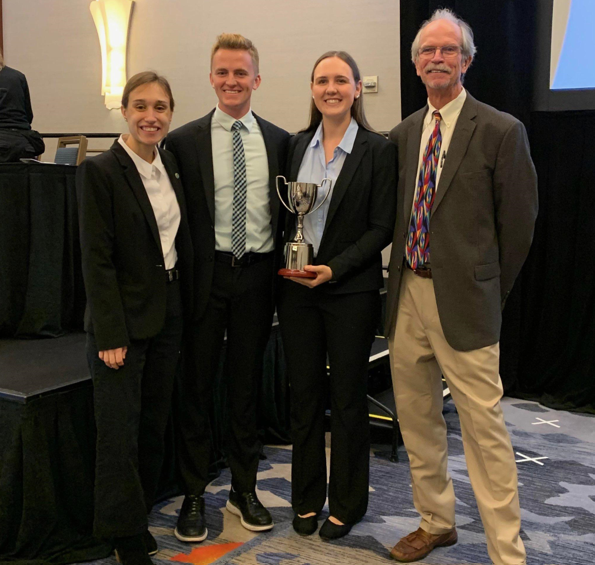 Congratulations to the Winners of the 2022 Clinical Pharmacy Challenge!
Congratulations to the Winners of the 2022 Clinical Pharmacy Challenge!
(Left to Right: Christina Beran, Ethan Shell, Alana Knapke, and Dr. John Murphy (Moderator))
Written by: Madeline Droney, ACCP SNAC Member-At-Large
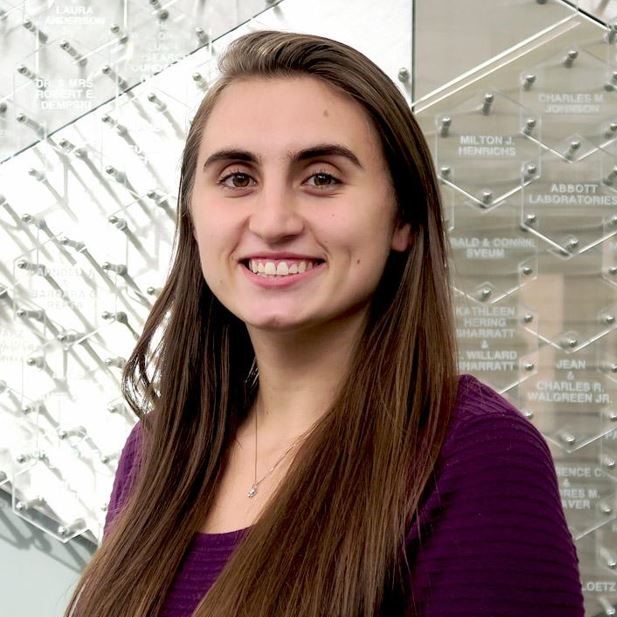
Kelsey Brasel
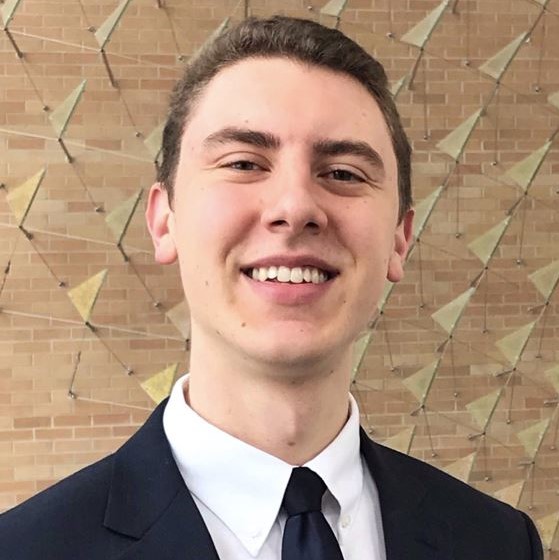
Justin_Ferek
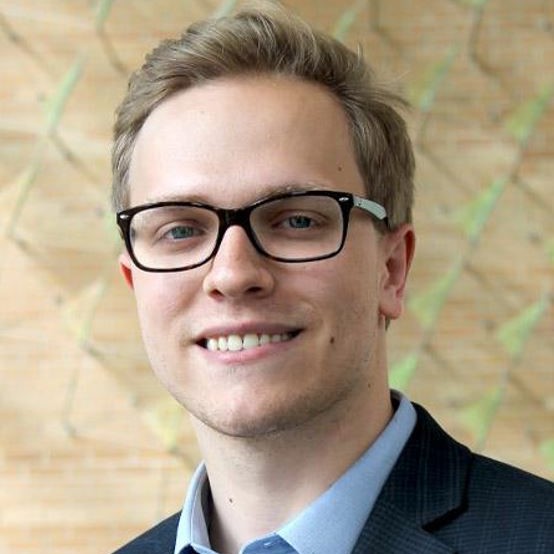
Thomas Lofy
Kelsey Brasel, Justin Ferek, and Thomas Lofy are fourth-year pharmacy students from the University of Wisconsin-Madison School of Pharmacy. They were selected by their school to join together and compete in the American College of Clinical Pharmacy (ACCP) Clinical Pharmacy Challenge (CPC) and succeeded in winning the national competition.
Getting to Know the Team
Where are you from?
Kelsey is from Green Bay, Wisconsin. Justin is from Carol Stream, Illinois. Thomas is from Slinger, Wisconsin.
|
Why did you choose pharmacy?
Thomas was on the fence about his career and decided to complete a bachelor’s degree in biochemistry to pursue research. His sister-in-law and grandmother encouraged him to investigate pharmacy as a potential career, and after shadowing an emergency medicine pharmacist at Frodert hospital he decided to go to pharmacy school. He appreciates how pharmacy works as a team and is right in the midst of the action in the emergency department.
Justin wanted to be an expert in medications and loved the vision of hospital pharmacists wearing their white coats and saving lives in the hospital through interventions. He appreciates how pharmacists are working behind the scenes utilizing their clinical knowledge and expertise to catch medication errors and mistakes that have the potential to cause harm. He also appreciates that pharmacists have limited interaction with bodily fluids.
Kelsey knew she wanted to work in healthcare, but did not want to encounter bodily fluids (similar to Justin). After shadowing some community pharmacists she fell in love with pharmacy. She values how pharmacists are heavily integrated in the hospital setting.
|
What are some unique or creative hobbies that have kept you busy during quarantine?
Kelsey has fostered a new love of baking, and keeps in touch with close friends with FaceTime.
Justin enjoys making homemade pizzas with friends. In the summer, he enjoys kayaking and disc golf.
Thomas is a major coffee-lover (as are all pharmacy students), and enjoys a good nonfiction book with a strong cup of coffee. In the summer he takes his books to his hammock outdoors, and he also enjoys kayaking with his family during the summers.
|
The ACCP Competition
How did you choose to work together on this team?
The University of University of Wisconsin-Madison School of Pharmacy elected to host their local competition for the CPC as an individual competition, and the top 3 scorers formed the team that would advance to the national competition. The 4th and 5th highest scorers were selected as back-ups as well.
Justin, Thomas, and Kelsey stated that it all worked out in their favor, because they all have great chemistry together and came in as a finely oiled machine. They appreciated how their school organized the local competition because each of them brought different clinical skills and knowledge to the table.
|
What did you do to prepare?
For these students, they walked in to the local competition with their baseline knowledge from their didactic and experiential learning experiences. For the national competition, once the team was formed, all 3 team members and the substitutes went through the practice tests to get a feel for the types of questions they would encounter.
They also timed themselves to monitor their pace.
Kelsey pointed out that the practice exams helped them figure out who knew what so that they could trust each other’s clinical knowledge.
Justin pointed out that his experiential rotations were helpful for the national competition because they taught him how to apply his clinical knowledge to the competition. He also emphasized that it is important to have a method of agreement with the team, such as categorizing each question as either memorization or more of a critical thinking and discussion question. His reason for emphasizing a team agreement method is because time is a limiting factor in the competition.
Thomas echoed the other team members’ points, and emphasized that the group preparation sessions with the practice tests were helpful in working out the team dynamics and ensuring that everyone agrees with every question. He pointed out that his team member, Justin, kept track of which topics were covered in between rounds so that members could prep for potential topics in future rounds.
|
What tips or tricks do you have for future competitors?
For Thomas, his main advice is to keep a plan of attack when it comes to the questions and the time constraints. He also emphasized that it’s important to stay positive - if it’s a difficult question for your team it’s most likely a difficult question for the other team. Even if you get a low score it’s important to keep a level head.
Kelsey stressed that pacing yourself and having a standardized approach is important. She also pointed out that checking for pharmacy updates with subscriptions to national organizations was helpful, because some of the competition questions covered new drugs or new indications for drugs.
Justin advises students to look at the ACCP website and the Jeopardy categories and sort them as “What do you have experience in?” He emphasized that everyone has some foundational knowledge, and he added that it’s important to have team members that have experience in critical care or emergency medicine and pediatrics. He also pointed out that there will be random questions, so identifying those weak points ahead of time is important.
|
In hindsight, is there anything you would have done differently to prepare?
For Thomas and Kelsey, they agreed that they wished they could go back and study the sections that they didn’t feel as comfortable with to get some baseline knowledge on more niche areas. However, it’s hindsight 20/20, because there is a fine balance between preparing for the competition and maximizing your time for rotations. Your time is spent more wisely on the major disease states and the guidelines, because a lot of the questions are guideline-driven.
Justin pointed out that a NAPLEX Prep book is a helpful tool to get a quick review on topics that aren’t taught formally in school.
|
Did you have a specific plan in choosing the questions in the Jeopardy round?
This team’s approach involved going category by category from the highest potential points to the lowest potential points. It allowed the team to not feel as much pressure when it came to the harder questions, because by starting with the more challenging questions they had more time to discuss and then move through the easier questions at a faster pace. This was especially helpful during a time crunch. Focusing on one category at a time also helped streamline the process.
|
Who was your most influential mentor?
All 3 members agree that their SCCP faculty advisor, Dr. Rotzenberg, was a huge support for them. Dr. Rotzenberg kept spirits high no matter what the score was, which helped the team members stay optimistic.
Thomas gave a special shout out to his preceptors on his emergency medicine rotation at Froedert, because they were gracious enough to let him complete some of the rounds while he was on rotation, and they were very encouraging.
Justin gave special thanks to faculty members Drs. Melissa Forbes, Jeff Fish, and Melissa Ha, because they helped him envision a succesful pharmacy career based on their methods of teaching and their embodiment of a stellar pharmacist.
|
What are your primary career goals?
All 3 members are pursuing a residency with an acute care focus and keeping their minds open about potential careers.
For Kelsey, she is interested in pediatrics, but is still looking for a well-rounded PGY1 residency.
Justin is most passionate about caring for patients in an acute care setting where pharmacy is embedded in the patient care team as a valued and respected team member. He also wants to work in a teaching hospital so he can mentor future pharmacists and pass along some of the lessons he has learned.
Thomas is primarily interested in emergency medicine and critical care, so he is looking at completing a PGY2 to specialize. Similar to Justin, he is primarily looking at academic medical centers.
|
A special thanks to Kelsey, Justin, and Thomas for their time during this virtual interview, and congratulations again on your success and teamwork in winning the 2021 ACCP Clinical Pharmacy Challenge this year! Best of luck in the future!
Written by: Adam Burkhard, PharmD Candidate 2021, The University of Texas at Austin College of Pharmacy
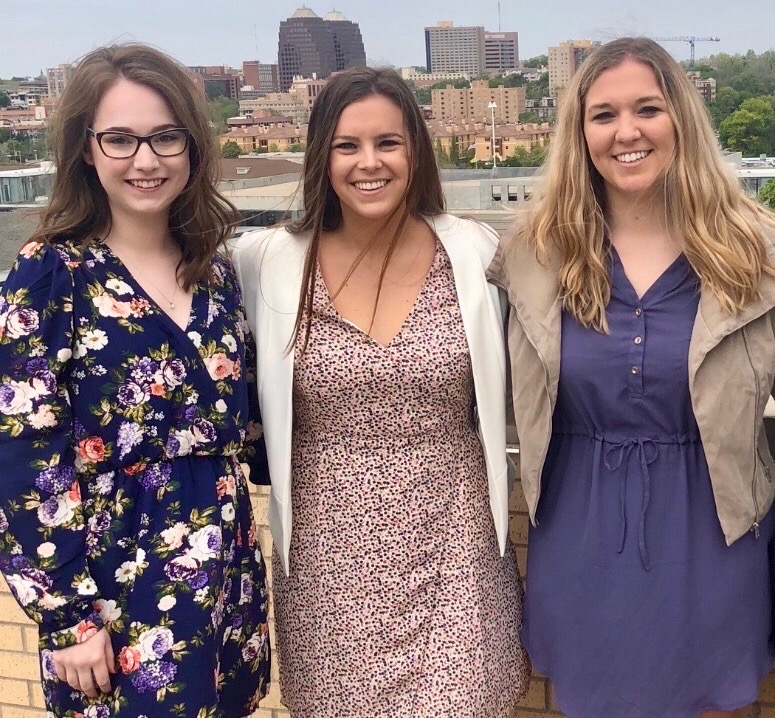 Meet the Winners of the 2020 Clinical Pharmacy Challenge!
Meet the Winners of the 2020 Clinical Pharmacy Challenge!
(Left to Right: Kathryn Rechenberg, Jamie Sullivan, and Brooke Jacobson)
Kathryn Rechenberg, Jamie Sullivan, and Brooke Jacobson of the University of Missouri-Kansas City School of Pharmacy scored an impressive victory over Auburn University Harrison School of Pharmacy to earn the title of 2020 ACCP Clinical Pharmacy Challenge champions. Although originally scheduled to take place in Dallas, TX, this year’s Clinical Pharmacy Challenge was hosted entirely online, posing a unique challenge to all participants of the competition. Rechenberg, Sullivan, and Jacobson navigated multiple rounds of the virtual tournament, eventually earning a seat in the finals. After their victory, the ACCP National Student Network Advisory Committee reached out to the competitors to ask a few questions.
How did you choose to work together on this team?
Sullivan: We are coworkers at Children's Mercy Hospital in Kansas City, Missouri, and we have known each other since completing our undergraduate classes at UMKC. When looking for a team of three, I knew that we would make a great team because of our diverse skill sets and our ability to work as a team.
Jacobson: We figured that we had such a good history of working together that being teammates would only make sense.
|
What did you do to prepare?
Rechenberg: Our preparation was really a culmination of the past three years throughout pharmacy school, clinical rotations, and work experience. If there were specific topics that we felt less comfortable with, we would review our pharmacotherapy notes and consult preceptors.
Sullivan: We did our best in the limited amount of time we had to prepare. We looked at the possible topics on the ACCP website and split the categories up between the three of us. We mostly used old class lecture notes and NAPLEX preparation materials to study. Prior to the quarterfinal round, we had a meeting with all of the UMKC ACCP advisors which really helped us feel more confident going into the last few rounds of competition. I think that our didactic education and experiential rotations at UMKC did a great job of preparing us for the competition.
Jacobson: In the beginning we each decided to review a few areas which we felt might need some extra refreshing. However, after the first couple of rounds, we mostly relied on our clinical knowledge obtained from our didactic coursework and APPE rotations.
|
What tips or tricks do you have for future competitors?
Rechenberg: I encourage everyone to participate in this competition! You won't know everything, but think of it as an opportunity to learn a topic prior to boards or patient care! Who doesn't love some friendly competition?
Sullivan: Have fun with the competition! It was stressful at times, but I will always remember how much fun I had competing with Brooke and Kathryn. I am glad we competed together because I think our level of trust and comfort with each other really helped us in every round. I also think it made a significant impact to have team members with different interest areas.
Jacobson: My biggest tip would be to make a plan. From the very first round of the national competition, we had a plan on how we would approach each section. This helped with the time aspect of the competition which was one of the more difficult parts to conquer. With each round we adjusted our plan as needed.
|
In hindsight, is there anything you would have done differently to prepare?
Rechenberg: We tried our best to come up with a strategy to work under the time pressure and virtually. We would adjust our strategy throughout each round if needed, but in hindsight, the most important thing was to trust each other which comes from a prior friendship and work relationship. If one person felt confident about an answer, we would rely on them and this teamwork paid off.
Sullivan: Our team was not selected to compete in the national competition until the day of the deadline, so we really did not have much time to prepare before the online rounds started. I would recommend having your team set at least a month or two in advance so that you can have practice sessions or study sessions.
Jacobson: In an ideal world, we would have reviewed guidelines prior to the rounds. However, we were all so busy with rotations, projects, and work that this was not very realistic. Of course we all typically review guidelines during our rotations so this was of course very helpful.
|
Did you have a specific plan for choosing the questions in the Jeopardy round?
Jacobson: For the Jeopardy round, we picked a section (normally starting from the left) and answered the 300-point question first followed by the 200- then 100-point questions. We continued this pattern with every section. This ensured that if we were crunched for time, we were able to spend the most time on the questions worth more points.
Rechenberg: I was in charge of watching the clock and would tell them time's up, pick our most educated guess and move on to the next question.
|
Who was your most influential mentor?
Rechenberg: Dr. Englin, our chapter adviser, was a tremendous mentor. She was very encouraging and supportive along the way. Following rounds that we felt less confident about, she would remind us how far we had come to set new records in representing UMKC during this competition. We could not have done it without the constant support from Dr. Englin, faculty at UMKC, the staff at Children's Mercy Hospital, and family.
Sullivan: Dr. Englin - one of the SCCP faculty advisors. She was with us through every online round as our proctor and always provided encouragement and reassurance.
Jacobson: Throughout the competition, Dr. Englin was a wonderful mentor. She is one of the SCCP advisors at UMKC and was our preceptor for every round. Before each round, she was incredibly encouraging and was always so excited that we were continuously moving on. After each round she always made sure we weren't down on ourselves if we felt we could have done better. She was a refreshing face to see after completing such intense rounds!
|
What are your pharmacy career goals?
Rechenberg: I am in the process of pursuing a PGY1 pharmacy practice residency at an academic medical center. I plan to complete a PGY2 but currently unsure what clinical specialty. I am excited for what is to come!
Sullivan: I plan to complete a PGY1 residency, hopefully at a pediatric hospital, and then a PGY2 in pediatrics.
Jacobson: After graduation in May, I'm hoping to complete a PGY1. I'm undecided on which clinical route I want to pursue, but my interests include cardiology, critical care, and pediatrics. I will likely complete a PGY2 in one of these areas.
|
What was your favorite part of the 2020 ACCP conference?
Rechenberg: My favorite part was working together with Jamie and Brooke. We have worked and studied hard these past three years and this competition was the perfect way to reconnect during a busy rotation schedule, share our love of learning, and celebrate how much knowledge we have gained and will continue to gain during the rest of this year and on into residency.
Sullivan: I was interested in the pediatrics PRN session about anticoagulation!
|
What are some unique or creative hobbies that have kept you busy during quarantine?
Rechenberg: Lots of baking and researching new travel destinations to visit post-pandemic.
Sullivan: I bought a stationary bike and have been doing spin classes from home, and I've been baking more than usual throughout quarantine.
Jacobson: Unfortunately I didn't do too many creative or unique activities during quarantine as I probably should have. But during the summer I spent as much time outside as possible - taking our dogs on walks and taking our pontoon out on the local lake.
|
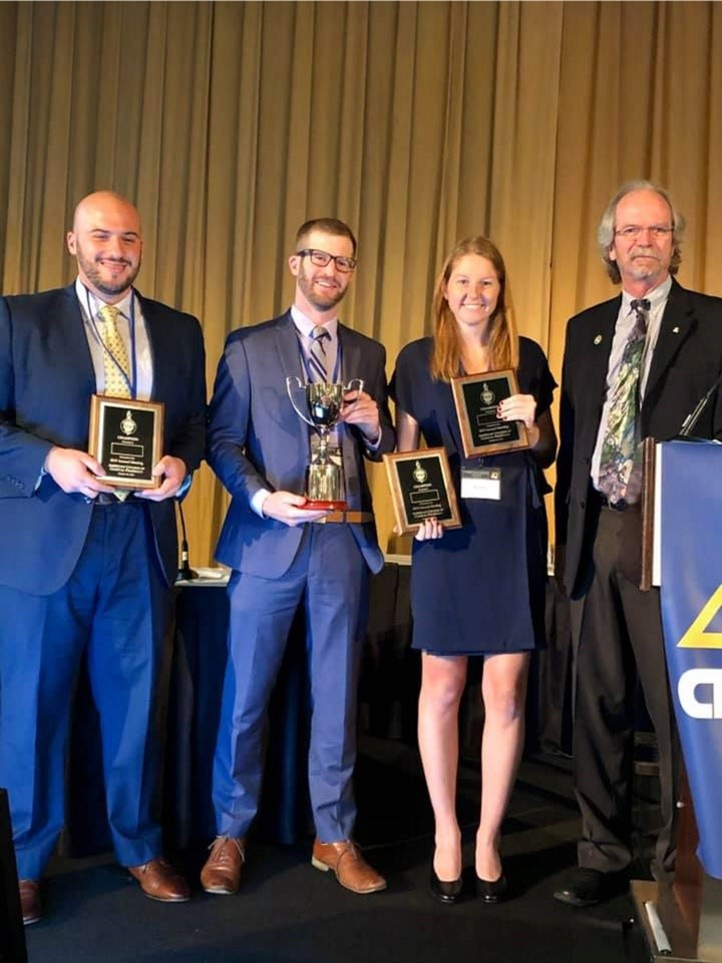 Meet the Winners of the 2019 Clinical Pharmacy Challenge!
Meet the Winners of the 2019 Clinical Pharmacy Challenge!
(Left to Right: Armen Fstkchian, Kyle Coronato, and Mary Reilly and Dr. John Murphy (Moderator))
Armen Fstkchian, Kyle Coronato, and Mary Reilly of the University of Colorado Anschutz Medical Campus Skaggs School of Pharmacy and Pharmaceutical Sciences wowed the crowd with their rapid-fire answers in the final Jeopardy-style round to take home the 2019 ACCP Clinical Pharmacy Challenge title. The crowds attending the final round of the competition, held this year at the 40th Anniversary ACCP Annual Meeting in New York, were on the edge of their seats until the final round. The Colorado team and the runner-up, the Butler University College of Pharmacy and Health Sciences, were neck and neck until the final round. Colorado pulled away to secure the win while answering question after question from each of the following categories: Cardiovascular Disorders, Endocrinology, Hematology/Oncology, Infectious Diseases, and Potpourri. After Colorado’s win, the ACCP National Student Network Advisory Committee team reached out to the competitors to ask a few questions.
How did you choose to work together on this team?
Fstkchian: Kyle and I are the local chapter vice president and president, and we were looking for a team member after our third member fell through. I immediately had Mary in mind, so we brought on our all-star.
Coronato: She is one of the smartest people we know, and we really knew she would be a huge asset to help carry the team.
|
What did you do to prepare?
Coronato: We split up all of our pharmacotherapy courses, and each took one-third to review. We reviewed for about a month and a half before the competition and were able to have our areas of expertise, together with the areas we were already passionate about. |
What tips or tricks do you have for future competitors?
Fstkchian: Find individuals with different strengths and strong suits to compete with. Mine would be ambulatory care. Mary’s would be just about everything, and Kyle is really strong within emergency medicine and critical care. Having a combination of people who know their career path and passions allows everyone to focus on these specific interests as well as strengths. This made it a lot easier for the “potpourri” of questions we encountered in each round of the competition. |
In hindsight, is there anything you would have done differently to prepare?
All: We would have booked an earlier flight. The team only got 2 hours of sleep the night before the quarterfinal round.
Fstkchian: We all took it seriously and studied as much as we could while on rotation, as we are all P4 students. Working hard and doing well on rotations also helped a lot in preparation.
|
Did you have a specific plan for choosing the questions in the Jeopardy round?
Reilly: We definitely chose the categories that included our strengths first. We were then able to take off on buzzing in and answering.
Fstkchian: We chose the Infectious Disease category first because it is a strength of all of ours. Any of us could have answered the questions, which I believe gave us an advantage. After that, we went with choosing a strong suit and what we felt we could confidently answer and knew best. We trained to build a lead and then relax, which is exactly what happened.
Coronato: We all have a passion for infectious disease, which helped us gain confidence going into the final round when the Jeopardy categories were revealed.
|
Who was your most influential mentor?
Reilly: Drs. Toby Trujillo and Joel Marrs were our advisers for this competition; they were there for us and checked in on us to make sure we were doing well. They supported us at both the local online competitions and the national competition here in New York.
Coronato: Our critical care and ID professors did an awesome job of preparing us in school to be very competitive. All of our professors did an amazing job actually preparing us for our future careers and this competition. Without the great teaching and direction from our professors, we wouldn’t have been able to answer a lot of those questions.
Fstkchian: I want to give a special shout-out to Dr. Benjamin Chavez; I had a stressful week before the competition, and he really supported and guided me through it to help me prepare for this weekend.
|
What are your pharmacy career goals?
All: We all will pursue a residency this coming application cycle, and we each have our own specific areas of interest for the future.
Fstkchian: Ambulatory care.
Coronato: Critical care or emergency medicine.
Reilly: Pediatrics and hematology/oncology.
|
What has been your favorite part of this conference?
Fstkchian: I have really enjoyed the camaraderie between our peers and the intelligence level of all the competitors. We had a big support group, including both faculty and students from CU. It was really great to see everyone here. CU is a big participator in ACCP, and we really buy into the organization, which was apparent by the support we had at the final round. Everyone was here supporting us and backing us up. We have such a family environment within our program.
|
Fun things you’ve done in New York and closing thoughts?
Fstkchian: Beautiful rooftop with a gorgeous night view of the city. I felt like I was in a Batman comic book.
Coronato: Visiting friends and family.
All: The competition was a fun way to prepare for the NAPLEX, and we will enjoy being prepared for the future.
|
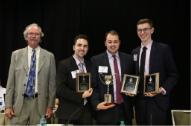 Meet the Winners of the 2018 Clinical Pharmacy Challenge!
Meet the Winners of the 2018 Clinical Pharmacy Challenge!
(Left to Right: Dr. John Murphy (moderator), Alex Chernov, Aidan Fischer, and Andrew Webb)
Aiden Fischer, Andrew Webb, and Alex Chernov of the University of Rhode Island College of Pharmacy
amazed a packed audience of pharmacists and pharmacy students at the 2018 ACCP Global Conference as
they competed in the final round of the ACCP Clinical Pharmacy Challenge. The group of fourth-year
students responded to questions at lightning speed, rarely missing. As the end of the jeopardy-style
round neared, you could glimpse a smile on the three faces; they had done the math and victory was imminent.
Following their impressive win, the ACCP National Student Network Advisory Committee team reached out to the
competitors to ask a few questions.
How did you choose to work together on this team?
Andy: Aiden and I had been working together for six years; we were freshman-year roommates. The two of us tried out for the team at the local competition hosted by UR as second-year students. Aiden made the team that year, and I was the alternate. The following year, the two of mpressive win, the ACCP National Student Network Advisory Committee team reached out to the competitors to ask a few questions.
|
How did you choose to work together on this team?
Andy: Aiden and I had been working together for six years; we were freshman-year roommates. The two of us tried out for the team at the local competition hosted by UR as second-year students. Aiden made the team that year, and I was the alternate. The following year, the two of Alex: I had not heard of this challenge before, but I figured it would be a good opportunity for me to further my clinical knowledge.
Aiden: As long as you have three strong individuals, you can make it work. Chemistry is important because you are going to have to make split-second decisions, and communication is key.
|
What did you do to prepare?
Aiden: Two years ago, I competed with two fourth-year students, as a second-year student. I received guidance from them, and we actually made top eight. The next year, we decided the best way to prepare was to figure out our strengths and weaknesses, so we made a spreadsheet. ACCP lists all of the jeopardy-style categories, so we ranked how we each felt about each category. If we weren’t as confident in one area, someone would pick it up nd study it to improve our baseline knowledge.
Andy: We tried to delve as deep as possible into our weakest areas so that we had at least one subject expert in every area. We started that around July of last year, and we did it again this year. Having somebody who was knowledgeable in each available subject area really made a difference because we had some level of comfort for every question.
Alex: It is important to remember that you can always go further. Even when you think you are at the top of your game, questions will sneak up on you and surprise you. You never know it all.
|
What tips or tricks do you have for future competitors?
Aiden: The number one thing, which is maybe easier said than done, is to relax. Hopefully you saw us laughing up on the stage. We try to have a lot of fun; I think that has served us well. As far as practical recommendations, we predict a lot of the questions that they will ask in the case segment. I would encourage future competitors to go through every single practice test that has been published for the last six years, which are all available on the ACCP website. Familiarize yourself with the types of questions they ask, why they ask them, and how they will flow. That will also help save time in the live rounds.
Andy: They do not repeat Jeopardy round categories that were used in previous online rounds, so you are able to eliminate categories that have already shown up. By the last online round, we likely knew what the topics were going to be, so we were able to really focus on those areas.
Additionally, reach out to your professors; reach out to subject area experts to learn about clinical pearls. The answers to many of the questions in this competition are not in textbooks, not on UpToDate, and not on Micromedex. Professors and subject area experts can share what exists in practice.
|
In hindsight, is there anything you would have done differently to prepare?
Aiden: When you are in your fourth year and on rotations, the best thing you can do is spend time at your rotation site.
Andy: If you let the questions you get wrong get to your head, it will really impair your performance going forward. If you get a couple questions wrong, it is what it is. All you can do is forge ahead and focus on what is coming next.
|
Did you have a specific plan for choosing the questions in the Jeopardy round?
Aiden: We picked our strongest categories first. Quick math calculations helped us figure out what risks we were willing to take. In the online rounds, we would do the 300-point questions first to get those out of the way.
Andy: It was a lot of strategy, in terms of, if we get X number correct, we will have X point advantage, and then we can try to work that out.
|
Who was your most influential mentor?
All: Dr. Kristina Ward. She has sacrificed so much for us. For the third round of the online competition, she had strep throat and had to have her husband drive her to the testing site where we met. Dr. Ward is super dedicated and so supportive. She wants us to succeed, and she is excited to see us succeed. The second it was announced that we advanced to the next round, she e-mailed the entire college.
|
What are your pharmacy career goals?
Andy: I want to pursue a residency, so a PGY1 and then a PGY2 in either critical care or neurology. I would like to eventually become a faculty member and researcher in neurology and neurocritical care.
Alex: I am interested in residency also and am looking into ambulatory care. I want to be involved in preventive care. Cardiology and psychology are primary interests of mine, so I hope to develop those areas further.
Aiden: Cardiology, primarily. Transplant. It depends on the month. I am trying to find places that have both options with good rotations. Ideally, I will complete a PGY1 residency somewhere and early commit to a PGY2.
|
What has your favorite part of this conference been?
Alex: I think meeting everyone. It is such a great community, and I have enjoyed networking with people from all over.
Andy: I thought the Emerge from the Crowd session was awesome, especially because that is becoming incredibly relevant this year. I have loved meeting people, and everyone is so welcoming and willing to meet you and talk with you.
Aiden: The residency information session was awesome, and the professional placement forum was good too. I would echo the sentiment about meeting people. I am usually a very socially anxious person, but when I came here I felt surrounded by people just like me, and I was able to open up to everyone. I have made a lot of friends.
|
Fun things you’ve done in Seattle and closing thoughts?
Starbucks Reserve. A magical place. Coffee Disneyland.
Pike Place Market was really cool – definitely something to check out.
Andy: Thank you to ACCP for putting on this competition. I feel like I don’t really have to study for the NAPLEX anymore. It has been an awesome experience and has probably been the most fun part of the conference. Not being up there, but sitting over here and watching the other teams has been so fun, seeing the expertise of all the different students.
Aiden: Accept the fact that you don’t know anything. The things you think you know you don’t know. Always be uncomfortable and willing to explore.
|
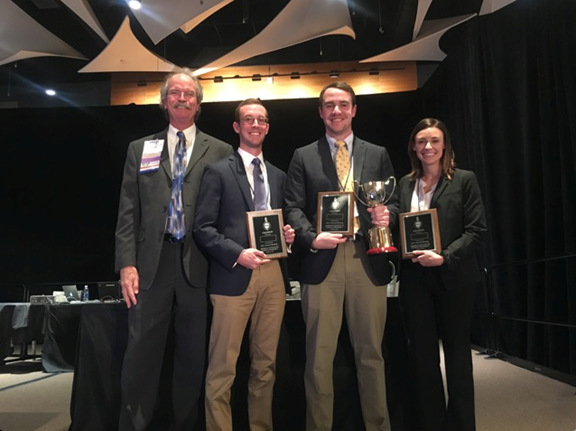 Meet the Winners of the 2017 Clinical Pharmacy Challenge!
Meet the Winners of the 2017 Clinical Pharmacy Challenge!
(Left to Right: Dr. John Murphy (moderator), Drew Spargo, Zack Haffler, and Jordan Rice)
How did you choose to work together on this team?
When University of Kentucky faculty member and ACCP Fellow, Dr. Kuhn, and an ACCP student member from the University of Kentucky started to recruit
students from their class, Zack, Jordan, and Drew knew they were all interested. To find the winning team, each interested student took a timed written
exam. Using the scores from this exam, students were randomly grouped into three and went through a written exam together to see how the students interacted.
This exam was then taken with different people to find the team that worked best together. The students with the top five scores moved forward, and 2 weeks
before the online rounds, the top three participants were finalized. Although Zack, Jordan, and Drew didn’t know going into this competition that they
would be the winning team, their connection and friendship was evident.
|
What motivated you to compete in the ACCP Clinical Pharmacy Challenge?
Although Zack, Jordan, and Drew realized how busy they would be as P4 students, they knew they would learn a lot by participating. They feel that by
participating in the Clinical Pharmacy Challenge, it was a return on their time invested because they learned so much in the process. This knowledge
would help as they moved through rotations and the NAPLEX in the future. Overall, they knew participating would help them be better professionals in
the future. Moreover, they had a lot of fun and really enjoyed it.
|
What did you do to prepare for the online and live rounds?
They started the beginning of the summer with weekly review sessions with faculty in their specific area of expertise. Faculty would provide them with
the topic that they felt would most affect their learning. They also split up the categories listed on the ACCP website among themselves and became responsible
for specifically working on that area.
|
What tips or tricks do you have for future competitors?
The most important part of this competition is strong communication among each other. You need to work as a team and feel comfortable confirming decisions
among each other. It’s crucial that you are not just three individuals, but one team.
|
What are your future career goals in your pharmacy profession? Do you feel the ACCP Annual Meeting had many opportunities to help advance your pharmacy residency preparedness?
Zack - Planning to complete a PGY1 residency with an interest in infectious disease, possibly a PGY2 residency as well.
Jordan - Planning to complete a PGY1 residency with an interest in acute care.
Drew - Planning to complete a managed care residency.
The ACCP Annual Meeting had many opportunities for students to advance their preparedness for residencies and beyond. The Emerge from the Crowd workshop was fantastic in
gaining knowledge regarding interviewing for residencies and writing a letter of intent.
|
Beyond the Annual Meeting, what did you enjoy most during your time here in Phoenix?
They enjoyed all of the delicious food and taking in a local arts festival. Beyond that, they looked forward to celebrating their win and experiencing the city!
Overall, Zack, Jordan, and Drew want to encourage students to compete in the Clinical Pharmacy Challenge because they found it
really fun. Although it involved studying and reviewing, the process and motivation to do well as they advanced made it really
fun. The team would like to thank ACCP for putting on the Clinical Pharmacy Challenge and the University of Kentucky College of
Pharmacy for its support. They would also like to thank the faculty who supported them and helped them prepare.
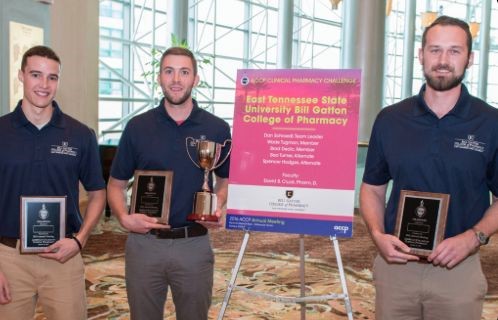 Meet the Winners of the 2016 Clinical Pharmacy Challenge!
Meet the Winners of the 2016 Clinical Pharmacy Challenge!
(Left to Right: Brad Dedi, Dan Schroedl, and Wade Tugman)
What did you do to prepare?
“We tried to practice together a little bit, especially before the live rounds, to conceptualize what the whole thing would look like. But once we got down here (to the 2016 ACCP Annual Meeting in Jacksonville, Florida), we probably didn’t do as much as you would think; we just made sure we were sticking together, hanging out, bonding a lot, and building those rituals every morning.”
|
What tips and tricks do you have for future competitors? In hindsight, what would you do differently to prepare?
“Take time to relax on the trip, especially before you go on(stage); don’t have your nose in the book. It’s not all about being masters of content, and it’s really important to find people you can work with to get the synergy going.”
“Put more time into some of [our] weaknesses to be more prepared. It’s one of those things you can’t be equally comfortable about in every area, so you just have to be able to weather the storm, but I think the whole point is to be hit in the jaw a little bit.”
|
What are your future career goals in pharmacy? Anticipating residency? Where do you see yourself in the next 5 years?
Wade: “I definitely want to do a PGY1 (residency) and hopefully a PGY2 after that. I have an interest in cardiology, infectious disease, and ambulatory care.”
Brad: “I am looking to do a residency as well, a PGY1. I have an interest in ambulatory care, so it might warrant a PGY2 as well.”
Dan: “I’m kind of late to deciding here but am split between two things right now. I kind of want to go into ownership eventually and have always had an interest in owning my own [independent] pharmacy. I’m still looking into applying for a PGY1 with an interest in infectious disease and emergency medicine.”
|
What motivated you to compete in CRC/CPC? What motivations did you have throughout your preparation?
“I think the answer to that question really changed as we moved through the competition. At first, it was a cool opportunity to compete and something cool to jump into; then, as we got through the rounds and they got more and more serious, our goals got more serious, and it was about representing the school and all the hard work the professors put in to prepare us. We wanted to represent them and all the hard work they put in.”
|
What did you find most interesting at the meeting besides the competition?
“We went to the Boardwalk, which is a ton of fun and checking out all the beach shops. Some of us have never been to Florida before so we are just trying to soak up the atmosphere and have some fun.”
|
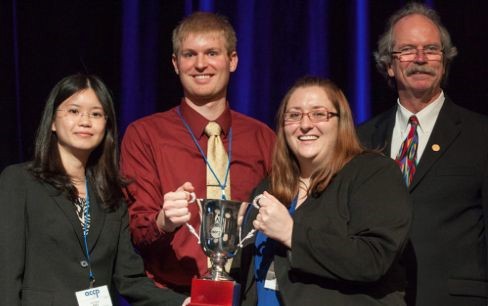 Meet the Winners of the 2015 Clinical Pharmacy Challenge!
Meet the Winners of the 2015 Clinical Pharmacy Challenge!
(Left to Right: Fei Tang, Andrew Radzak, and Rebecca Pulk, and Dr. John Murphy (moderator))
What did you do to prepare?
“We included our alternate, Deeter, in our team preparation and truly worked as a cohort of four. From the beginning of the competition, we identified our individual focus areas through a group Excel document delineating the topic areas for the test. We did a lot of individual studying focused on the areas we were responsible for building from a foundation of class notes, guidelines and board review material to review our areas of focus.”
|
What tips and tricks do you have for future competitors? In hindsight, what would you do differently to prepare?
“Expose yourself to complex patients and clinical material that will stretch you. Get hold of review materials for board certification exams (pharmacotherapy, pediatrics, ambulatory care, oncology, critical care, and psychiatry) and use them to prepare. Keep reviewing flashcards and look for patterns in drug activity and side effects. Start to learn drugs as you would actually use them in the clinic (renal and hepatic dosing). Never stop studying!”
|
What are your future career goals in pharmacy? Anticipating residency? Where do you see yourself in the next 5 years?
Andy - Interested in clinical hospital practice.
Fei - Interested in clinical research and drug development.
Rebecca - Interested in the interface of clinical and outcomes research.
Deeter - Interested in clinical hospital practice.
|
What motivated you to compete in CRC/CPC? What motivations did you have throughout your preparation?
“Throughout the meeting and studying period, our group remembered to have fun as a team, which helped us learn to trust each other and know each other’s strengths. Coming into the live rounds, we agreed as a team that we were going to go down swinging and chose to be aggressive with our answers. We remembered never to give up, especially since we always struggled with the lightning rounds!”
|
What did you find most interesting at the meeting besides the competition?
“It was also awesome to meet other students and practitioners from around the country and the world. The PRNs offer such a unique way to network and connect with practitioners in our fields of interest. We also had a lot of fun getting out to explore San Francisco.”
|
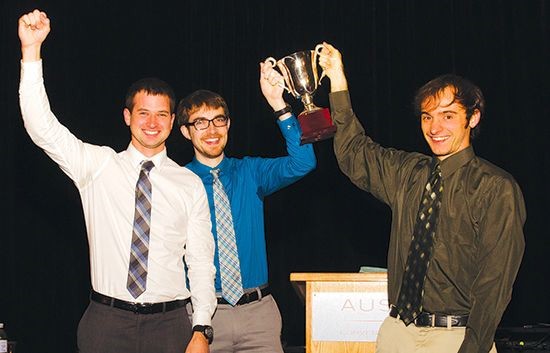 Meet the Winners of the 2014 Clinical Pharmacy Challenge!
Meet the Winners of the 2014 Clinical Pharmacy Challenge!
(Left to Right: Matt Watson, Nick Scarpino, & Brandon Muckley)
What did you do to prepare?
“We first looked at the sample questions from the previous year on the ACCP website which allowed us to see the level and content of questions we could potentially be asked. Also, the sample questions document outlined potential topics that we could see in the jeopardy round and we focused our efforts in studying those. Each of us would pick separate topics to study so we could cover a large amount of material.”
|
What tips and tricks do you have for future competitors? In hindsight, what would you do differently to prepare?
“It is important to retain the information that you learn throughout pharmacy school and not erase it from your mind after every test. There seemed to be to different types of questions. Some seem like they are very drug specific and you either know it or you don’t. The other set of questions were case based and more broad. With these you almost have to go with your gut feeling.”
|
What are your future career goals in pharmacy? Anticipating residency? Where do you see yourself in the next 5 years?
Brandon’s interests were oncology and anticoagulation, Nick psychiatry medications and pain management, and Matt enjoyed infectious disease and general adult medicine. Matt plans to pursue a PGY- 1 residency and would like a career in critical care, internal medicine or infectious disease. Brandon and Nick plan on continuing their education next year at Indiana University School of Medicine.
|
What motivated you to compete in CPC? What motivations did you have throughout your preparation?
“We did a good job of asking each other questions to practice how well we knew certain material which inevitably would lead to someone asking a follow-up question and the cycle would continue. We also did a good job of congratulating the person who knew an answer and not blame them if they happened to answer incorrectly.”
|
What did you find most interesting at the meeting besides the competition?
Nick really enjoyed the PRN Focus Sessions. They discussed interesting and current topics in pharmacy. “Some of our favorites were the toxicology session, medical marijuana and derivatives and the impact on pharmacists, and dual antiplatelet therapy session and cases. Other than that, we definitely enjoyed the Texas barbeque.”
|
Who was the most influential mentor in preparing for the competition? How were they influential to you?
They would like to give special thanks to faculty advisor Dr. Zach Weber and all their professors at Purdue.
|
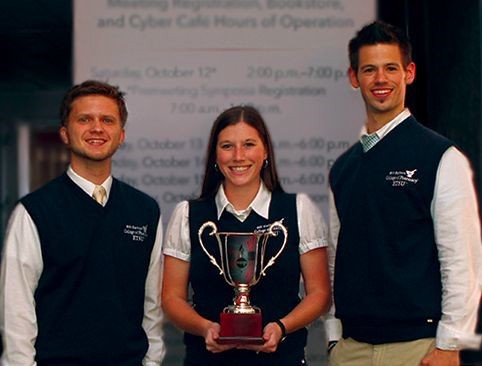 Meet the Winners of the 2013 Clinical Pharmacy Challenge!
Meet the Winners of the 2013 Clinical Pharmacy Challenge!
(Left to Right: Josh Whaley, Allie Torrence, and Brandon Leeson)
What did you do to prepare?
“Preparing for this event consisted primarily of studying in an approach very similar to that recommended by ACCP for the BCPS exam, except we tried to split up topics among the three members. We also tried to select topics that we either personally felt weak in at baseline or just wanted to freshen up on; that way, the entire team would hopefully be well rounded in its knowledge base.”
|
What tips and tricks do you have for future competitors? In hindsight, what would you do differently to prepare?
“Study hard, work together as a team (talk your way through as many questions as you can as opposed to taking the approach of one person leading the whole team), and have fun. Oh yeah, and just take it one round at a time!”
“If you limit your knowledge to only the things taught in class, it likely won’t be enough. Our professors do a wonderful job of preparing us to be excellent pharmacists, but the questions asked in the challenge go well beyond basic pharmacy knowledge.”
|
What motivated you to compete in CPC? What motivations did you have throughout your preparation?
“We were all very supportive of each other. If we missed a question, one of us usually said, ‘It’s OK, we will get the next one.’ We were also good at praising each other when we did well on questions. We tried to stay upbeat and positive during the entire competition. I think motivation was generated after each successful round throughout the competition.”
|
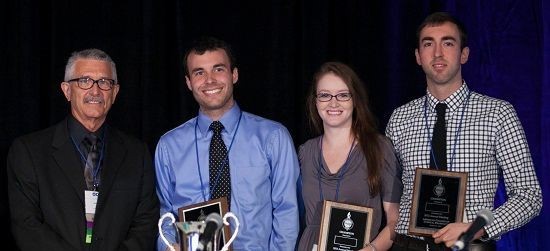 Meet the Winners of the 2012 Clinical Pharmacy Challenge!
Meet the Winners of the 2012 Clinical Pharmacy Challenge!
(Left to Right: ACCP Past President William Kehoe, Matt Lord, Libbi Rice, and Adam MacLasco)
Beginning with an initial field of 90 teams from across the Unites States, 8 advanced through four preliminary online rounds to represent their institutions in the quarterfinal round of competition held at the 2012 Annual Meeting in Hollywood, Florida.
During the final round, the Northeastern and Purdue teams answered questions that focused on pharmacology, pharmacokinetics/pharmacodynamics/pharmacogenomics, biostatistics, and health outcomes in the Trivia/Lightning segment. The Clinical Case segment challenged the students to answer five multiple-choice items based on a critical care case vignette.
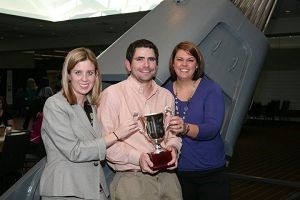 Meet the Winners of the 2011 Clinical Pharmacy Challenge!
Meet the Winners of the 2011 Clinical Pharmacy Challenge!
(Left to Right: Karyn Fabo, Clayton Moore, and Erin Dickert)
New features of the 2011 competition included the addition of a local competition examination, an expansion of the number of preliminary online rounds, and an increase in the number of teams invited to compete in live round competition.
From the initial field of 84 teams, 8 advanced through four preliminary online rounds to represent their institution in the quarterfinal round of competition held at the 2011 Annual Meeting in Pittsburgh, Pennsylvania.
During the final round, students on Team Tennessee and Team Campbell answered items on pharmacology, pharmacokinetics/pharmacodynamics/pharmacogenomics, and pharmacy history in the Trivia/Lightning segment. The Clinical Case segment challenged the students to answer five multiple-choice items based on a pediatric clinical case vignette.
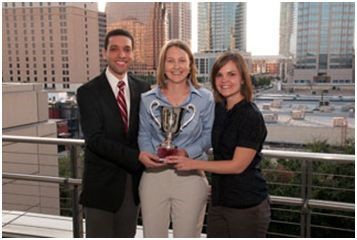 Meet the Winners of the 2010 Clinical Pharmacy Challenge!
Meet the Winners of the 2010 Clinical Pharmacy Challenge!
(Left to Right: Ramy Elshaboury, Lacy Ternes, and Camille Beauduy)
The first ACCP student competition was held in 2010 and participants included 94 student teams representing 75 schools and colleges of pharmacy. In the final round, Team Minnesota challenged the University of California–San Diego, and claimed first place in the student competition.
In the words of Dr. Murphy, “The first annual ACCP Clinical Pharmacy Challenge was a tremendous success.”